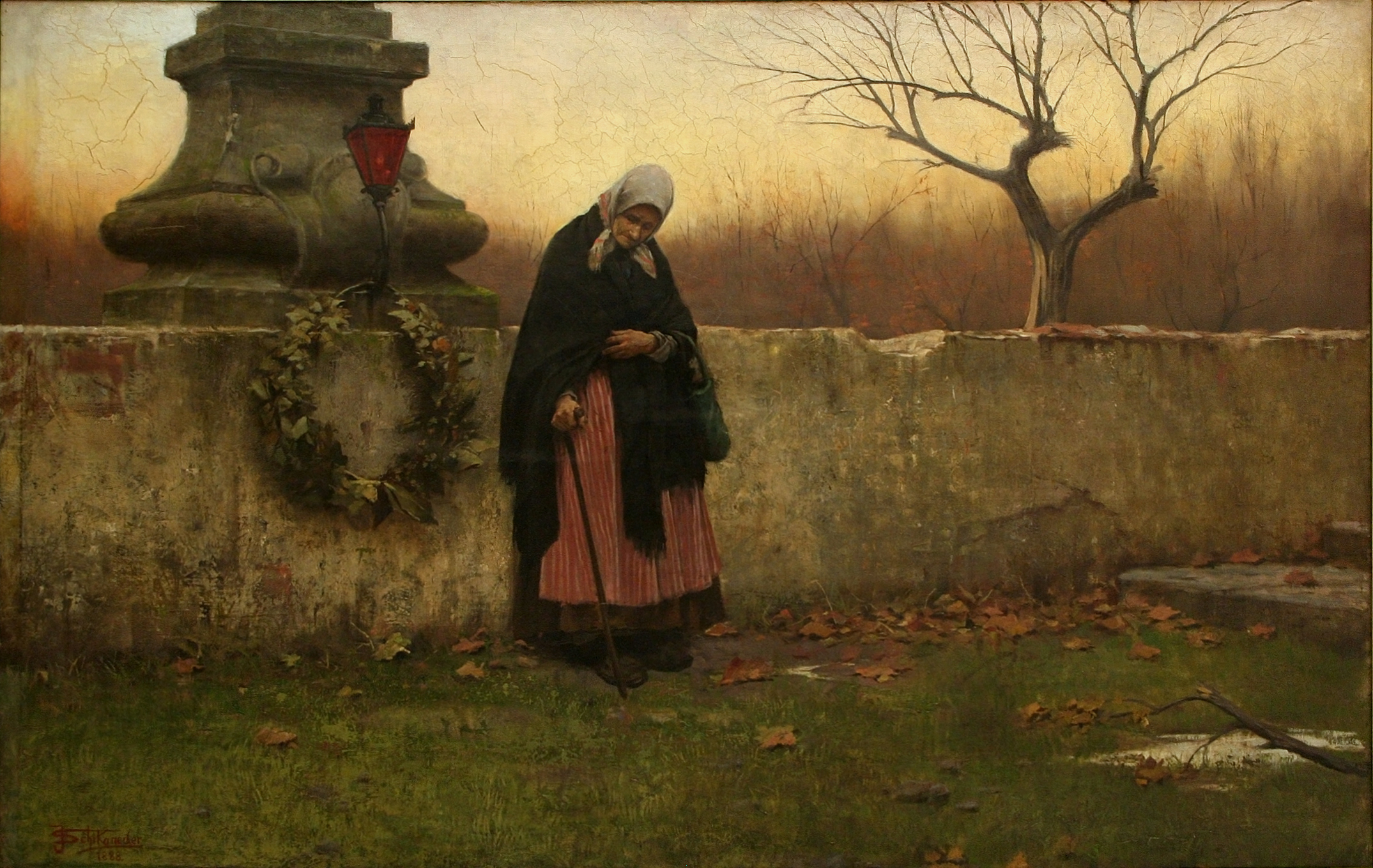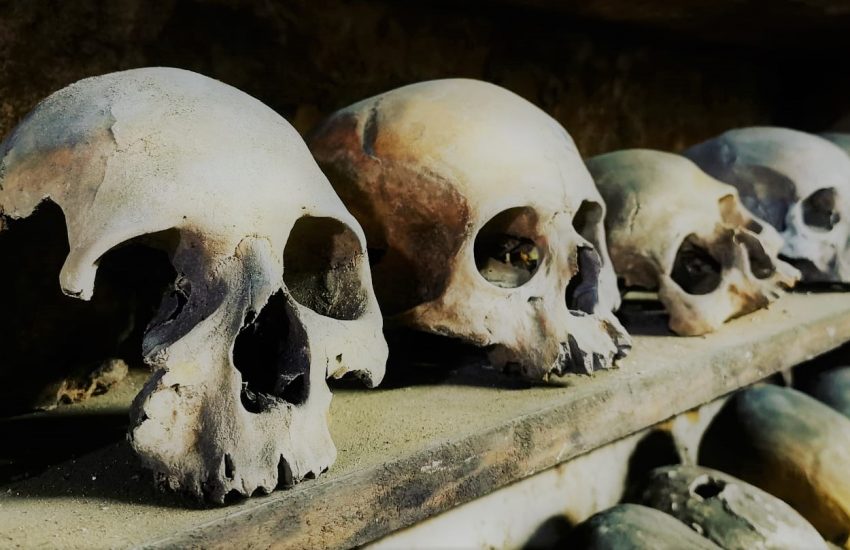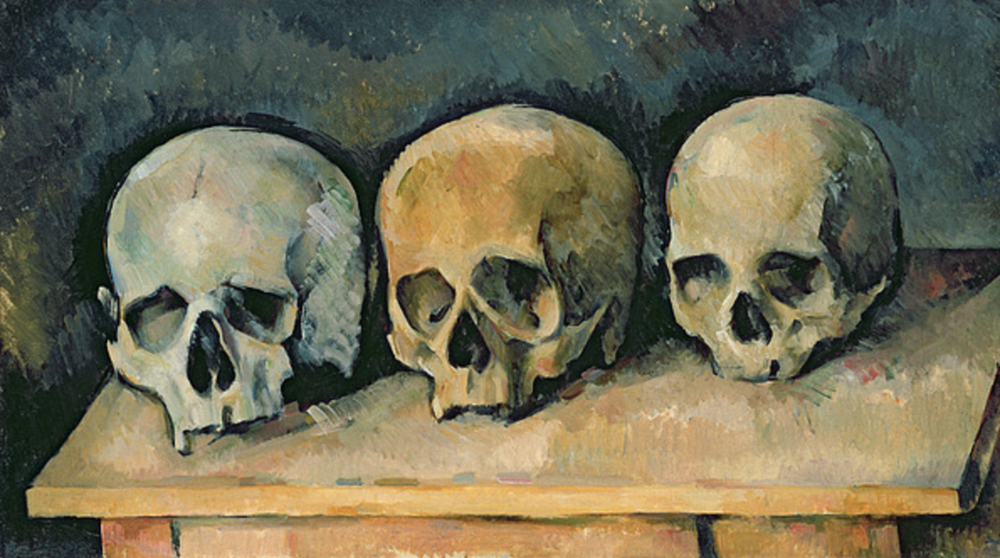Gospel For Today: All Soul’s Day
THE COMMEMORATION OF ALL THE FAITHFUL DEPARTED

Yesterday the Church celebrated the solemnity of All Saints, the day on which we celebrate those Christians who have gone before us in sanctity and are now in heaven enjoying the beatific vision of God. Though we celebrate individual saints on feast days throughout the year, not all of the saints of God are known by name to us and so the Church has set aside this day since the eighth century to honor all of the saints, known and unknown. An archaic word for “saint” is “hallow,” (as in “hallowed be thy name” in the Lord’s Prayer) and so All Saint’s Day used to be known as All Hallows Day, and the evening before it as All Hallows Eve, from which we derive the name Halloween.
Today, Nov. 2, the Church celebrates All Souls Day. Today we recall the faithful departed, but rather than celebrating the lives of those now in heaven, and asking for their prayerful intercession on our behalf, today we recall those souls who are not yet in heaven and pray for them, that they may soon join the saints in the beatific vision of God. I speak, of course, of those souls in Purgatory.
Both the Old and the New Testament speak about offering prayers for the dead. In 2 Maccabees 12:44-46, we read, “for if he were not expecting the fallen to rise again, it would have been useless and foolish to pray for them in death. But if he did this with a view to the splendid reward that awaits those who had gone to rest in godliness, it was a holy and pious thought. Thus he made atonement for the dead that they might be freed from sin.” In the New Testament we read of St. Paul offering prayers for his deceased friend, Onesiphorus. “May the Lord grant mercy to the family of Onesiphorus because he often gave me new heart and was not ashamed of my chains… May the Lord grant him to find mercy from the Lord on that day” (2 Tim 1:16-18).
Why do we pray for the dead? We do not pray for those in heaven, for they have no need of our prayers. Indeed, we ask for their prayers as they see God face to face and can intercede on our behalf. We do not pray for those in hell, as hell is an eternal punishment and there is no release from it. Prayers would be ineffective and pointless. But the Bible tells us, and the tradition of our faith affirms, that it is “a holy and pious thought” to pray for the dead.
We offer prayers for the souls who are in Purgatory, a temporary state of purification that many souls must endure before they enter heaven, and where our payers can help to ease their suffering and speed along their purification. The Catechism of the Catholic Church teaches us that “all who die in God’s grace and friendship, but still imperfectly purified, are indeed assured of their eternal salvation; but after death they undergo purification, so as to achieve the holiness necessary to enter the joy of heaven. The Church gives the name Purgatory to this final purification of the elect, which is entirely different from the punishment of the damned” (CCC 1030-1031).
Here are a few things to know about Purgatory. First, every soul in Purgatory is saved. Every soul in Purgatory will make it to heaven. Purgatory is a temporary place. In the end there are only two options for eternity: heaven or hell. At the end of time, Purgatory will cease to exist. Second, Purgatory is a place of purification, not punishment. We often think of Purgatory as a place of pain and suffering because sometimes purification hurts (think of putting alcohol on a wound). But the suffering in Purgatory is redemptive suffering, not punishment.
What does all this mean, and from where does the Church derive this teaching? We have already seen how the Bible speaks of praying for the dead. That implies that there must be a state after death where our prayers can do some good. The Bible also assures us that nothing unclean can enter heaven (Rev 21:27). Different translations render this as impure or defiled or profane. This means every soul in heaven is perfectly pure.
The Bible also tells us that there are varying degrees of sin. Both James 1:13-15 and 1 John 5:16-17 speak about the difference between sin which is deadly and sin which only wounds (we refer to these today as mortal and venial sins). All sin is bad, but not all sin is deadly. So what happens if you die and are guilty only of venial (non-deadly) sin? You still have eternal life, but you are not perfectly pure. Something has to happen to purify you before you enter heaven. That something is Purgatory.
There is also the concept of accountability for our sins. Every sin has multiple consequences. The most important of these are the eternal consequences. Venial sin wounds our relationship with God, while mortal sin breaks that relationship. That relationship is restored through repentance (including the sacrament of Reconciliation) and forgiveness. But there are also temporal (in time) consequences for our sins. There is harm done to our human dignity. There is harm done to our human relationships. There is harm done to the health of our souls. If we repent of our sins, God forgives us, and that is the most important thing. But there is still penance that needs to be done on our part to remedy the damage done by our sin.
Think about it this way: if you sin against me by slashing the tires on my car, and later repent and ask my forgiveness, I may forgive you and so our relationship is healed. But my car still has four flat tires that need to be replaced. If you are truly sorry you will be willing to make reparation for the damage you caused and replace my tires.
The repentant sinner knows he or she is forgiven in Christ but still desires to make atonement for sin by suffering along with Christ. This is our Christian doctrine of redemptive suffering (what we mean when we say “offer it up”). If the suffering and penance we undergo in this life is not sufficient for the sins we have committed, we will complete that redemptive suffering in Purgatory. As Christ says in Matthew 5:26, we will not be released from prison until we have paid the last penny. But we will be released.
Purgatory is both a realistic teaching of the Church (in that it presents a realistic view of the effects of sin and our fallen human attachment to sin), and a merciful teaching of the Church. I am grateful for Purgatory. I know and I trust that I am forgiven in Christ. But I know I am not perfect. I know I am not pure. By God’s grace I hope to be made so, but until that day I am not fit for heaven. I can only be made fit for heaven by God’s grace. And that is what Purgatory is. If I have not cooperated fully with God’s grace so as to be perfected in this world before I die, then God will continue His work in me after death until I am pure. So long as I die in God’s friendship and repent of my sins, I know God will take care of me both in this world and the next.
Our faithful prayers here in this world can assist in that ongoing work of purification. This is why we pray for one another here, and pray for the souls in purgatory. Prayer for the souls in purgatory is considered a work of mercy by the Church and is something we should remember to do each day. But let us especially pray for them, as a united Church, today as we commemorate all the faithful departed. And let us ask the intercession of all the saints in heaven to join in our prayers so that they may soon be joined by their brothers and sisters still being made perfect.



